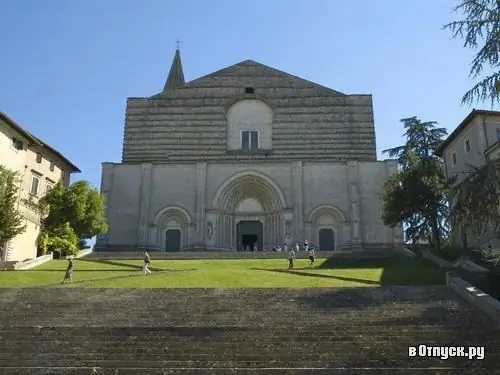
Description of the attraction
The Church of San Fortunato in Todi was built by Franciscan friars and once belonged to the Vallombrosa Order. The first stage of construction lasted from 1292 to 1328 - during this time the choir stalls and two of the four vaulted galleries were completed. This was followed by an almost century-long break, and only in 1408 work on the construction of the church was resumed. Despite the fact that the facade of San Fortunato was worked on from 1415 to 1458, it remained unfinished. And the church itself was completed only in 1468.
The graceful main portal, created in the years 1420-1436, is decorated with carvings depicting scenes from the Last Judgment, which almost exactly repeat the portal of the Cathedral of Orvieto. The two stone lions that greet visitors at the top of the stairs leading to the church were taken from a 7th century Romanesque temple that stood here earlier. The interior decoration of the church, consisting of three naves of the same height, is interesting - a similar layout can also be seen in the churches of San Domenico and San Lorenzo in Perugia. But the massive multi-faceted columns and pointed vaults of San Fortunato make it the most significant example of this kind of architecture in all of central Italy.
The side chapels, which were originally conceived as part of the church, are also quite typical for Renaissance Italy. Usually they were bought by wealthy families, who then turned the chapels into their family crypts. And the church received a lot of money for this.
The slight differences seen in the first pair of columns and in the small windows of the first two vaulted galleries remind us that San Fortunato was built in two phases. To the right of the first column is a Gothic bowl of holy water. In the chapel, on the same side, you can see a fresco depicting the Madonna and Child with angels by Masolino da Panicale. Another chapel is decorated with frescoes by Giotto's students in the first half of the 14th century. Above the entrance to the chapel is a 14th-century pulpit. The wooden choir seats are the work of Antonio Maffei di Gubbio, who worked here in the late 16th century.
In the crypt under the church is the tomb of Jacopone da Todi, a zealous Franciscan monk who was one of the first followers of the teachings of St. Francis of Assisi. In addition, he was a poet who wrote in the so-called "vulgar" Italian language, which later formed the basis of modern Italian.






